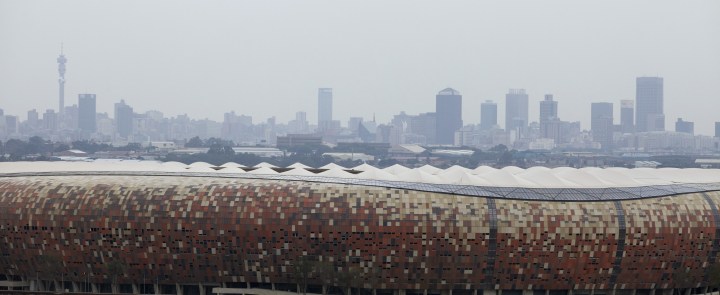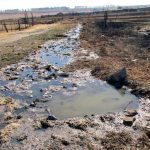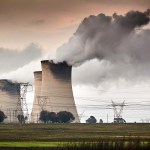POLLUTION SOLUTIONS
City of Joburg reopens vandalised air quality monitoring station to clean up ‘the air we share’

The level of pollutants in the air over Johannesburg is well above the WHO’s limits, with the city being ranked as the second most polluted in the world after Delhi. The City of Joburg says it’s making concerted efforts to stop polluters and cut emissions.
On the day that Johannesburg reopened its Roodepoort Air Quality Station, the city was ranked as the second most polluted city in the world, after Delhi in India, according to Swiss air pollution monitoring site IQAair, a real-time air pollution exposure calculator.
Johannesburg’s high economic activity sees emissions from power plants, industrial and manufacturing activity and the burning of fuel in residents’ homes. The city also receives significant cross-border pollution from neighbouring provinces.
The relaunch of the City of Joburg’s Ambient Air Quality Monitoring Station in Davidsonville, Roodepoort, on Thursday, 8 September, is part of efforts to create awareness about the city’s air pollution problem. The event was part of the City of Joburg’s Air Quality Week, which was aligned with the UN-designated International Day of Clean Air on 7 September.
Councillor Michael Sun, the mayoral committee member for Environment, Infrastructure Services, said in his address at the launch that even though residents could not smell the toxins, it didn’t mean they weren’t there.
He told Daily Maverick: “Today was important because it’s not just [International Day of Clean Air], but it’s also Johannesburg Air Quality week… The air that we share, we need good quality and we need it to be clean. The only way to ensure that, as the government of Johannesburg … is by having air quality monitoring stations.”
Beyond monitoring the air quality, the station also measures solar radiation, wind speed and direction, as well as relative humidity. Measurement data is sent to a local and national station and the information is shared on the South African Air Quality Information System. The station was left unoperational for more than three years after being vandalised; its doors were stripped and equipment was damaged. There are further plans to upgrade the station, at the cost of millions of rands.
The Roodepoort facility, which resembles a small food truck, is one of nine air quality monitoring stations across all regions in the city. Seven of these are operational. The Delta Park station in Randburg is down because of vandalism.
“This will better serve the residents and let them know that in the former mining area, where there is more pollution than other places in the city, it is important that we … educate the youth on the importance of keeping the air quality good and healthy,” Sun said.
Visit Daily Maverick’s home page for more news, analysis and investigations
In June, a sulphur smell in the central and northern parts of Gauteng and in North West made residents wary of the effects on their health. At the time, Sun issued a notice saying the stench was not harmful, but sensitive groups were left vulnerable.
Something rotten this way comes — sulphur stench in Gauteng and North West investigated
South Africa’s air pollution limits are weak against those on the global stage, making air pollution difficult to tackle.
Fine particulate matter (PM 2.5) is a pollutant that is of concern for people’s health when its levels are high. As of 2019, the national ambient air quality standard concentration is a PM2.5 level of 25 micrograms per cubic metre (μg/m3), compared with that of 5 μg/m3 set by the World Health Organization (WHO) when it tightened its guidelines in 2021. On Sunday evening, 11 September, IQAir showed Johannesburg air was 6.2 times higher than the WHO’s annual air quality guideline value.
The WHO’s tightening of regulations came as new research underscored the effects of air pollution on health. Air pollution poses a threat to human health as particles settle in the lungs and can cause respiratory infections, nasal irritation, coughs and headaches; especially among vulnerable groups.
Air pollution exposure causes seven million premature deaths a year across the globe. In South Africa, 10,000 premature deaths are directly attributable to air pollution in the Highveld Priority Area, which includes parts of Gauteng and Mpumalanga and is characterised by high levels of mining, chemical and manufacturing activity.
Screws tighten on big polluters and Creecy after resounding ‘deadly air’ legal victory
Along with the relaunch of the air quality station, Sun said there had been efforts by City officials to ensure there was sufficient working equipment in place to monitor air quality. He added that there were also awareness campaigns about air quality, pollution and keeping the environment clean being conducted in communities across Johannesburg.
Sun said the burning of illegal dumps was one of the bigger contributors to poor air quality. He added that in the mission to minimise air pollution, the City was monitoring industrial polluters. It was also investigating the use of new technologies, such as drones, to collect samples over potential polluting activities, which would help identify and stop polluters and lead to the issuing of fines.
The MMC said that Johannesburg’s high number of motor vehicles was also a major contributing factor to the city’s poor air quality. The City was investigating the establishment of “low emission zones” in parts of the city, which would see fewer private vehicles and more public transport travelling through particular areas and thus limiting emissions.
Said Sun: “By marrying the two [private and public transport] to find the best middle ground … we’re going to keep people moving smoothly while still maintaining a level of quality air in the city.” DM/OBP





















The statement that “the city being ranked as the second most polluted in the world after Delhi” is simply untrue.
Check the website of :- iqairDOTcom and the table of “world-most-polluted-cities”.
No South African city is in the top-50 and anyone who has visited India or China will know that we are nowhere close to the situation in those countries.
What is the point of such obvious misrepresentation and what is Daily Maverick doing to ensure that such “fake news” is not published?